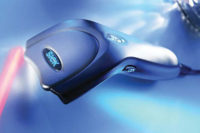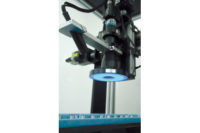Reliable Code Reading
MP3 players are destined for a demanding consumer market and cannot be compromised in any way. Code reading is an essential product-tracking procedure for printed circuit boards (PCBs) used in MP3 players, allowing manufacturers to protect themselves against costly recalls and product mix-ups, as well as allowing for damage control in the event of a problem. Sony’s Malaysian plant (Penang, Malaysia) had an issue with badly read codes, which resulted in high rejection rates that were costing the company money in terms of re-work and rejected units. When this code-reading system proved incapable of rising to the challenge, Sony began searching for a solution.


Sony tested different readers, but in the end chose the In-Sight 5110 ID reader from Cognex (Natick, MA). The 5110 out-performed other products, having a better read rate in terms of decoding speed and sturdiness. The reader also offers perspective distortion support that ensures reliable reading even when at an angle to the PCBs. Jobs are stored in the reader in a way that allows several reading attempts at different exposure values-the reader adapts itself to the surface of the PCB, thus increasing the chance of successful reading.
TK Tan, staff engineer at Sony, Penang, says, “The fact that we have improved our code-reading times and increased our success rate to 100% saves us valuable time and boosts our production efficiency-we hope to implement these vision solutions elsewhere for other OCR applications.”
Cognex Corp.
(508) 650-3000
www.cognex.com
- The readers save Sony about $5,000 a week, because there is no longer the problem of badly read code, nor the need for product repositioning or focus adjustment.
- Sony expects a return on investment within 10 months.

Fast Reliable Readings
Each PCB passes along a conveyer on nine production lines and is marked with a datamatrix code containing product information in 10 characters measuring only 1 millimeter by 1 millimeter. Production volume at the plant is high at 40,000 units a day, so Sony needed to find a reading solution that would guarantee a read rate of 100%, eliminating downtime, allowing nonstop production line work. The company’s existing code reading solution had an average rejection rate per week of 10,000 units, costing the company money and delaying time to market.
Solution in Sight
It is vital that the serial number marked on each PCB heading for product assembly lines be identified and tracked. If the code reader is not capable of adjusting to the product changeovers on lines, a serial number can be missed and data is lost. No two read points are the same. Lighting, environment and the way the piece is presented can differ greatly, so code-reading equipment must have the robustness and flexibility to perform reliably under the variants in conditions.Sony tested different readers, but in the end chose the In-Sight 5110 ID reader from Cognex (Natick, MA). The 5110 out-performed other products, having a better read rate in terms of decoding speed and sturdiness. The reader also offers perspective distortion support that ensures reliable reading even when at an angle to the PCBs. Jobs are stored in the reader in a way that allows several reading attempts at different exposure values-the reader adapts itself to the surface of the PCB, thus increasing the chance of successful reading.
100% Read Rate
In-Sight 5110 ID readers are now installed on nine production lines, replacing the existing readers. Code-reading time is now 2 seconds per read, whereas competitors took more than 10 seconds to provide a reading. The code reading success rate has increased from 95 to 100%. With a 100% successful code-reading rate, the production line no longer has to stop as a result of a badly read code. The line also no longer needs to be stopped for product repositioning or focus adjustment. These factors are already saving Sony about $5,000 a week; this calculation comes from the 5% failure rate within 200,000 units per week based on a unit cost of RM1.5. The company expects a return on their investment within 10 months.TK Tan, staff engineer at Sony, Penang, says, “The fact that we have improved our code-reading times and increased our success rate to 100% saves us valuable time and boosts our production efficiency-we hope to implement these vision solutions elsewhere for other OCR applications.”
Cognex Corp.
(508) 650-3000
www.cognex.com
Benefits
- In-Sight 5110 ID readers have given Sony a 100% successful code-reading rate.- The readers save Sony about $5,000 a week, because there is no longer the problem of badly read code, nor the need for product repositioning or focus adjustment.
- Sony expects a return on investment within 10 months.
Looking for a reprint of this article?
From high-res PDFs to custom plaques, order your copy today!




